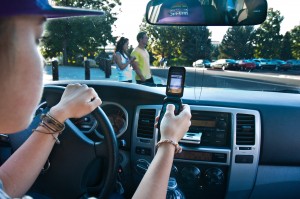
Texting while driving makes you 23 times more likely to experience a car crash, according to the United States Department of Transportation.
A study conducted by Marks & Harrison law firm found that in Richmond, Virginia, 43 percent of teenagers engage in the illicit behavior of texting while driving. The study is a product of hours of surveying through hundreds of local high school student questionnaires,” said M&H outreach specialist Frederick Miner. Miner commented how the firm was surprised to find such startling numbers.
“The part that we find unsettling is that the group we studied reported the lowest level of empathy towards those around them,” Miner said. “When it comes to using technology while driving, some teenagers simply don’t care.”
Miner confirmed that while the study relies on voluntary surveys, the reality of the issue might be worse.
“You have to remember that some people won’t admit to it,” Miner said, “And the ones that disclose their behavior tend to be quite ashamed to admit it. In reality we only got a glimpse of the actual problem. Getting real statistics from empathic surveyees on how many people are getting injured because of this is almost impossible.”
For David M. Trudell, there are no reasons to excuse texting and driving in any situation. Trudell is one of the project managers behind the “Drive Alive Richmond” campaign.
“I cannot understand what conversation is so important that a driver would need to type it out,” Trudell said. “A message can always wait.”
Trudell feels that Millennials are likely to drive while distracted by technology because of their sense of entitlement and the need to be online at all times.
“Young people from this generation are brilliant,” Trudell said. “They are brave, ambitious and possess native digital talent that my generation lacked. Sadly, that acuity towards technology makes them overestimate their ability to maneuver a phone device while driving. They are overshadowed with entitlement, and the need to be instantly gratified consumes them.”
Park Nicollet Institute Senior Statistician Sara Richter analyzed the survey data. She determined that although the majority of teens are aware of the risks, 58 percent of them still engage in this driving behavior.
“Numbers aren’t just numbers, and the consequences are very much real,” Richter said. “The statistics we analyzed represent the amounts of a very tangible reality. Our generation feels that we have to do everything in the car, as if we were in our living room or at work. I believe that for change to occur, our definition of what a moving vehicle is has to change. A car is more than just a car; it is a tool that doubles as a weapon.”
Currently, 46 states, including Guam, Puerto Rico, D.C. and the U.S. Virgin Islands, ban text messaging for all drivers.
While there is no prohibition on cell phones for voice communication while driving in Utah, Utah law establishes that the usage of any handheld wireless device to transmit text while driving a vehicle is prohibited and can carry severe consequences if caught.




